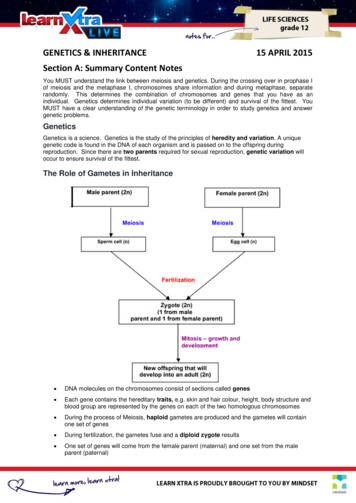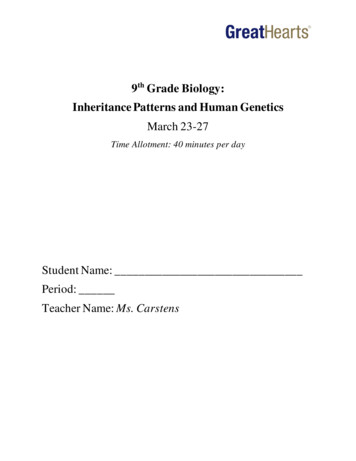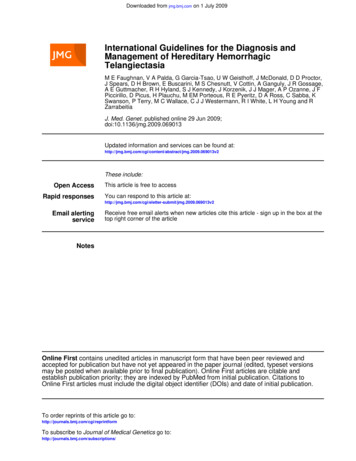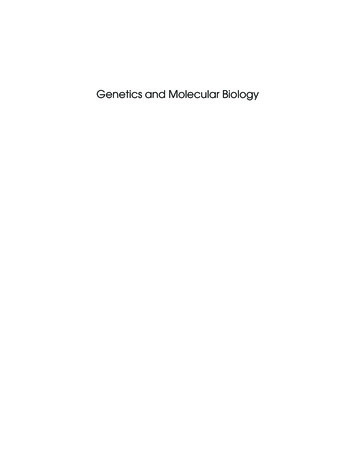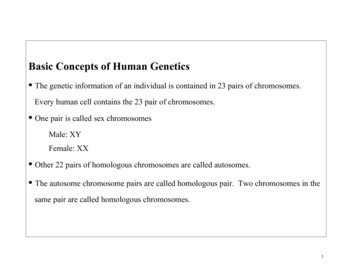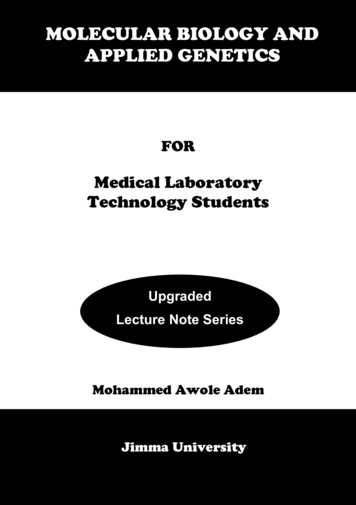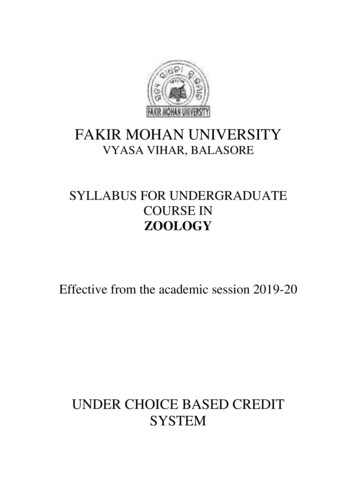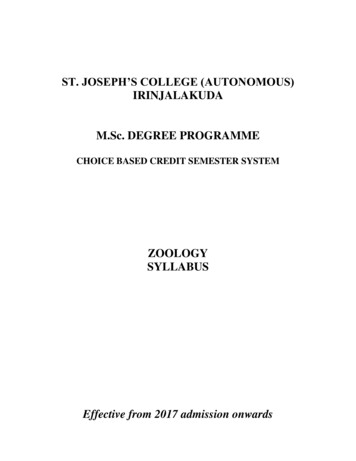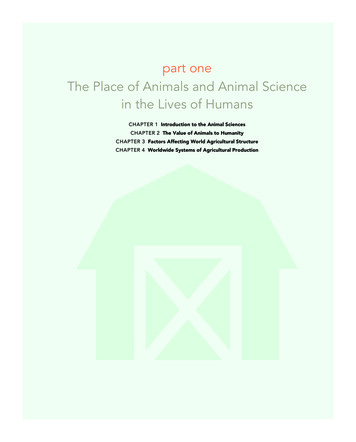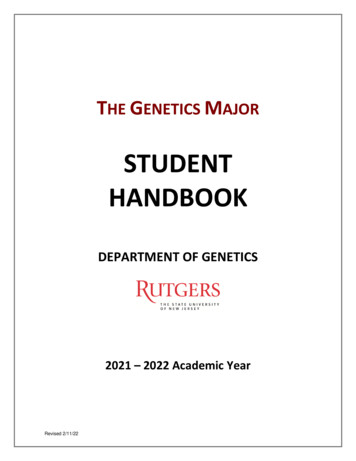
Transcription
THE GENETICS MAJORSTUDENTHANDBOOKDEPARTMENT OF GENETICS2021 – 2022 Academic YearRevised 2/11/22
TABLE OF CONTENTSI. Introduction . 4II. Departmental Contact Information . 5III. Faculty . 6IV. Declaring the Major . 8V. Learning Goals and Curriculum . 101. The Division of Life Sciences Core . 102. The Genetics Major Core . 113. The Genetics Research and Electives Requirement . 12Using Degree Navigator For The Genetics Major . 15VI. Genetic Counseling Certificate Program (GCCP) . 23VII. Computational Genetics Certificate Program. 25VIII. Advising . 27IX. Independent Scholarship – Getting Started. 28X. Independent Scholarship – Requirements and Expectations . 30Registering for Research . 30Expectations of the Research Student . 31Guidelines for Research in Genetics (447:406-407) . 31Guidelines for Research in Genetics – Writing Intensive (447:410) . 33Guidelines For Summer Research Courses (447:406-407) . 33Guidelines for Genetic Counseling Rotation (447:488) . 35Guidelines for Advanced Independent Study in Genetics (447:489-490) . 35Guidelines for Honors in Genetics (447:408-409) . 35Travel Stipends . 37XI. Honors Guidelines . 38XII. The SAS Core Curriculum and The Genetics Major. 41XIV. Association of Undergraduate Geneticists (AUG) . 47XV. Academic Integrity . 48XVI. Joint BA/MD and BA/DMD Programs . 49XVII. Courses Offered By the Department of Genetics . 50XVIII. Example Pathways Towards Completing the Genetics Major. 513
I. IntroductionThe Department of Genetics offers students majoring in Genetics the opportunity to work onimportant research problems with renowned scientists in state-of-the-art laboratories. Whilethese opportunities are only possible in a major research university, Genetics majors still enjoysmall class sizes and the personal attention one would expect only at a smaller college.The Major in Genetics provides an excellent background in the natural sciences within an overallliberal arts curriculum. We provide comprehensive instruction in Mendelian, molecular,evolutionary, statistical, and computational genetics. Students not only learn the terms,concepts, and theories underlying the field of genetics, but also are able to use what they havelearned to critically analyze published research as well as conduct their own research. At the endof four years, all of our students are able to design experiments, conduct the research using theappropriate laboratory techniques, and analyze and interpret their data. They also learn tocommunicate their discoveries through a written article appropriate for publication in a peerreviewed journal, as well as through oral presentations and posters appropriate for scientificmeetings. Upon completion of our degree, our students are prepared to enter graduate orprofessional schools, or the life sciences and health professions workforce.Undergraduate research is the intellectual heart of our major. The Department is committed toteaching science through the way we do science - through the process of research and discovery.Every student completes a minimum of two semesters of laboratory research or independentstudy under the direction of a faculty member. Many of our students are authors on researcherpapers in leading scientific journals. All of our undergraduate majors are afforded theopportunities formerly available only to Honors students.Undergraduate students work closely with Genetics faculty members in addition to their researchmentor. Upper-level elective courses have small enrollments. In addition, every student isassigned a faculty advisor upon declaring the major. This advisor can discuss course selection andcareer goals.The success of our major is documented by the success of our students. Genetics is one of thesmaller departments at Rutgers University but we consistently rank among the top threedepartments for students completing an Honors thesis. Our majors go on to top graduate andprofessional schools, or obtain technical positions conducting research in industry or academia.This student handbook is meant to be an introduction to students who are considering majoringin Genetics. In addition, it is a quick reference that describes the curriculum and therequirements for conducting and completing the Genetics major. While the department updatesthis handbook regularly, students should nevertheless check the Genetics Department website orconsult with a Genetics Department advisor to obtain information and guidance on the latestpolicies and procedures.4
II. Departmental Contact InformationThere are two departmental offices, both of which are located on the Busch campus in twodifferent buildings. The Main Departmental Office, as well as the Human Genetics Institute, is inthe Life Sciences Building, 145 Bevier Road, Piscataway, NJ 08854-8082 (henceforth called “LSB”).The Undergraduate Departmental Office is located in the Nelson Biological Laboratories Building,Room B412, 604 Allison Road, Piscataway, NJ 08854-8082 (henceforth called “Nelson”).For most undergraduate administrative questions, students are encouraged to contact theUndergraduate Departmental Office:Genetics Undergraduate OfficeProgram CoordinatorGenetics Undergraduate Departmental OfficeNelson B412, Busch Campusgeneticsugd@hginj.rutgers.eduStudents may also contact the Vice Chair for more specific questions concerning therequirements of the major:Dr. Gary HeimanVice ChairNelson B412, Busch CampusBusch Campusheiman@dls.rutgers.eduFor Genetics Department administrative issues:Marylou CarmonaDr. Tara MatiseDepartment AdministratorNelson B422, Busch CampusPhone: 848-445-1638carmona@dls.rutgers.eduChairNelson B422Busch Campusmatise@dls.rutgers.edu5
III. FacultyChairTara Matise, B.S., Cornell; M.S., Ph.D., PittsburghUndergraduate Vice-ChairGary Heiman, B.A., Boston University; M.Sc., Sarah Lawrence; Ph.D., Columbia UniversityDistinguished ProfessorsMaureen Barr, B.A., Rutgers University; Ph.D., Columbia UniversityLinda M. Brzustowicz, A.B., Harvard (Radcliffe); M.D., Columbia UniversityJay A. Tischfield, B.S., Brooklyn College; M.Ph., Ph.D., YaleLei Yu, B.S., Wuxi College of Light Industry, Wuxi, China; M.S., Institute of Genetics, NationalAcademy of Sciences, Beijing, China; Ph.D., California Institute of Technology, Pasadena,CaliforniaProfessorsDavid E. Axelrod, B.S., Chicago; Ph.D., TennesseeTara Matise, B.S., Cornell; M.S., Ph.D., PittsburghKim S. McKim, B.S., Simon Fraser University; Ph.D., University of British ColumbiaBryce Nickels, B.S., Chemistry, Miami University; M.S., Ph.D., Harvard UniversityChristopher G. Rongo, B.A., UC San Diego; Ph.D., Mass. Institute of TechnologyAmrik S. Sahota, B.S., Bath (UK); M.S., Loughborough (UK); Ph.D., London (UK)Andrew W. Singson, B.S., UC Davis; Ph.D., UC San DiegoAssociate ProfessorsDerek Gordon, B.A., University of Rochester; Ph.D., SUNY Stony BrookGary Heiman, B.A., Boston University; M.Sc., Sarah Lawrence; Ph.D., Columbia UniversityKaren Schindler, B.S., Loyola University; Ph.D., Thomas Jefferson UniversityGleb Shumyatsky, B.A., Moscow State University; Ph.D., Institute of Molecular Genetics(Moscow)Michael Verzi, B.A., The College of New Jersey; Ph.D. UCSFJinchuan Xing, Ph.D., Louisiana State UniversityAssistant ProfessorsMarco Azaro, B.A., Brown University; Ph.D., Brown UniversityChristina Bergey, B.A., New York University; M.A., NYU; Ph.D., NYUChristopher Ellison, B.A., Lewis & Clark College; Ph.D., UC BerkeleyDevanshi Jain, B.Sc., University of Edinburgh; Ph.D., University College LondonJessica Joines, B.S., University of Richmond; M.G.C., University of Maryland atBaltimore; C.G.C., American Board of Genetic CounselingTetsuya Nakmura, B.S., Osaka University; Ph.D., Osaka UniversityLourdes Serrano, B.Sc., Ph.D., Universidad Autonoma de Madrid (Spain)6
Premal Shah, B.T., Anna University (India) ; Ph.D., University of PennsylvaniaJuan Wang, B.S., Ph.D., China Agricultural University (Beijing)LecturersDoreen Glodowski, B.S., University of Wisconsin-Stevenspoint; M.S., Kansas StateUniversity; Ph.D., University of Wisconsin-MadisonMartha B. Haviland, B.A., Rutgers; M.S., A.M., Ph.D., MichiganAdjunct FacultySteven Brant, B.A., Brandeis University; M.D., University of Florida College of MedicineYana Bromberg, B.A., SUNY at Stony Brook; M.Phil., Columbia University; Ph.D. ColumbiaUniversitySteven G. Buyske, B.A., Haverford College; M.Sc., Brown University; Ph.D. BrownUniversity; Ph.D., Rutgers UniversitySuzie Chen, B.S., Trinity College; M.S., Ph.D., Albert Einstein College of MedicineBonnie Firestein-Miller, B.S., Michigan; Ph.D. UC San DiegoMichael Gatza, B.S., Virginia Tech; Ph.D., Baylor College of MedicineMichele B. Horner, B.A., Rutgers University; M.S., University of PittsburghSteven Libutti, B.A., Harvard University; M.D., Columbia UniversityJames Millonig, B.S., University of Rochester; M.Sc., University of Oxford; Ph.D., PrincetonUniversityJoaquin Santolaya, M.D., Universidad Autónoma de Madrid; Ph.D., University of London(UK)Leonard Sciorra, B.A., Rutgers University; M.S., Seton Hall University; Ph.D., HahnemannMedical School (now Drexel University College of Medicine)Zhiyuan Shen, M.D., Norman Bethune University of Medical Sciences; M.S., Institute ofRadiation Medicine (China); Ph.D., CSUDeanne Taylor, B.A., Wellesley College; Ph.D., University of MichiganNathan Treff, B.S., Eastern Washington University; Ph.D., Washington State UniversityHetal Vig, B.S., Pennsylvania State University; M.S./M.G.C., University of MarylandBarbie Zimmerman-Bier, B.A./M.D., Brooklyn College; M.D., SUNY Downstate MedicalSchoolEmeritusJudy Flax, B.S., The College of NJ; M.A., Montclair State University; Ph.D., CUNYTerry R. McGuire, B.S., Ohio State; Ph.D., IllinoisHoward C. Passmore, A.B., Franklin and Marshall College; Ph.D., MichiganLee D. Simon, B.A., Wesleyan; M.S., Ph.D., RochesterNavin K. Sinha, B.S., M.S., Patna (India); Ph.D., MinnesotaWilliam H. Sofer, B.S., Brooklyn College; Ph.D., MiamiAnn C. St. John, B.S., Penn State; M.S. Ph.D., Wisconsin-Madison7
IV. Declaring the MajorStudents wishing to major in Genetics must have satisfied the following requirements: Be a School of Arts and Sciences (SAS) studentBeen enrolled at Rutgers University for at least one semester.Have a cumulative GPA of at least 2.00 (Note that a GPA of 2.80 is required to registerfor independent research and therefore to graduate in the major)Have earned a “C” or better in the following courses or their equivalents (e.g., AP credit,officially accepted transfer credit, et cetera):o General Biology (119:115-116)o General Biology Lab (119:117)o General Chemistry, either of these two-course combinations: 160:161-162 160:163-164o Mathematics, any one of these two-course combinations: 640:135,136 (Calculus I, Calculus II for the Biological Sciences) 640:151-152 (Calculus I and II for Mathematical and Physical Sciences) 640:135 and 960:401 (Basic Statistics for Research) 640:151 and 960:401 (Basic Statistics for Research)Note: A grade of "C" or better in courses credited toward the major is required for graduation,and each course may be repeated only once to replace D/F grades. 640:136 (Calc II, 4 cr) maybe substituted for 640:138. 640:192 (Honors Calc II, 4 cr) may be substituted for 640:152.960:379 (Basic Probability) or 960:212 may be substituted for 960:401 (Basic Stats forResearch).To declare the major, students should register online at erOnce students have completed their online registration, they must be approved by theDepartment Chair or Vice Chair. No one will be approved for the major until they haveattended a Major Declaration Meeting. More information about this meeting can be found onthe Department rgraduate/requirementsAll communication with students will be conducted electronically through your Rutgers email.Due to the Federal Education Rights and Privacy Act (FERPA) information related to youracademics cannot be sent to an alternate email.8
There is no minor in Genetics. Please note that students may not major in more than one ofthe four programs of study offered by the Division of Life Sciences. In addition, students maynot declare a major in both Genetics and Biotechnology (SEBS), or Genetics and Microbiology(SEBS). In general, students may not major in Genetics and minor in a Biology-orientedprogram from SEBS. Contact the Vice Chair (heiman@dls.rutgers.edu) if you have questionsabout a second major. Students majoring in Genetics may not minor in one of the otherprograms offered by the Division of Life Sciences.9
V. Learning Goals and CurriculumThe curriculum of the Department of Genetics is centered around four main goals:1. Knowledge specific goals: Know the terms, concepts and theories in the field of genetics.2. Integrate the material from multiple courses and research. That is, to think holisticallyand to see the whole as well as the parts.3. Use genetic information and ideas to critically analyze published research articles in thefield of genetics.4. At the end of four years, all our students will be able to design an experiment, carry outthe research using the appropriate laboratory techniques and analyze and interpret theirdata. They will also be able to communicate their discoveries through a written articleappropriate for publication in a peer-reviewed genetics journal, and through talks orposters appropriate for scientific meetings.The present curriculum is based on the Rutgers New Brunswick Undergraduate Catalog 20152017 (http://www.rutgers.edu/academics/catalogs). The curriculum applies to students in theClass of 2015 and thereafter. The Genetics Major Curriculum is comprised of three components:1. The Required Division of Life Sciences (DLS) Core2. The Genetics Major Core3. The Genetics Research and Electives RequirementA. The Division of Life Sciences Core (18 Credits) General Biology (119:115-116)General Biology Lab (119:117)General Chemistry, either of these two-course combinations:o 160:161-162 (General Chemistry)o 160:163-164 (Honors General Chemistry)o 160:163-164 (General Chemistry – Special Sections)Introduction to Experimentation (160:171)Organic Chemistry, either of these two-course combinations:o 160:307-308 (Organic Chemistry)o 160:315-316 (Honors Organic Chemistry)Organic Chemistry Laboratory (160:311)Calculus I (any one of these):o 640:135 (Calculus I)o 640:151 (Calculus I for Mathematical and Physical Sciences)o 640:191 (Honors Calculus I)Calculus II or Statistics (any one of these):o 640:136 (Calculus II)o 640:152 (Calculus II for Mathematical and Physical Sciences)o 640:192 (Honors Calculus II)10
o 960:379 (Basic Probability and Statistics)o 960:401 (Basic Statistics for Research)o 960:211-212 (Statistics I & II combination)General Physics (any one of these):o 750:203-204 (General Physics combination) and 750:205-206 (lab combo) Some Calculus needed.o 750:193-194 (Physics for the Sciences – includes lab) No Calculus needed.o 750:271-272 (Honors Physics combo) and 750:275-276 (lab combo) Honors Physics.o 750:201-202 (Extended General Physics combination – includes lab) Recommended for students who did not take Physics in high school orare weaker in math.Note: Appropriate AP credits or transfer courses approved by the Office of UndergraduateInstruction (OUGI) may be substituted. Other substitutions are described in the CurriculumWorksheet, available uate/student-formsand require the permission of the departmental Vice Chair (heiman@dls.rutgers.edu).B. The Genetics Major Core (17 Credits) B1. Genetics Core Sequenceo Genetic Analysis I and II (447:384-385)B2. Genetics Laboratory Course, one of these courses:o Honors Computational Genetics (447:203)o Introduction to Research in Genetics (447:315)o Quantitative Biology and Bioinformatics (447:302)o Computational Genetics of Big Data (447:303)o Introduction to Molecular Biology and Biochemistry (694:214)o Honors Introduction to Molecular Biology and Biochemistry (694:215)o Honors Introduction to Molecular Biology, Biochemistry, and Genetics Research(694:316)B3. Biochemistry, either of these two courses:o Introduction to Biochemistry (694:301)o Molecular Biology and Biochemistry (694:407)oB4. Communication in Genetics, either of these two:o Effective Communication Skills in Genetics (447:430)o Thesis Writing and Communication in Genetics (447:414-415)Note: Genetics 447:380 may not be substituted for either Genetics Analysis I or II (447:384-385) If a student should switch from the Genetics major to one of the other Division of LifeSciences majors, both 447:384 and 447:385 (and only both) may be used to fulfill the11
Genetics requirement for those majors (normally fulfilled by Genetics 447:380)Genetics major core requirements cannot be satisfied by transfer coursesThe 11:115:403-404 (General Biochem, 3,3 cr.) series may be substituted for 694:301(Intro to Biochem) but is not recommended. Requires the permission of the departmentalVice Chair447:315, 447:302, and 694:214 are only offered in the Spring semester447:203, 694:215, and 694:316 are only offered in the Fall semester and to SAS Honorsstudents or Honors College students447:214 and 447:215 are only offered to first-year students with AP Biology credit and APGeneral Chemistry credits (or taking General Chemistry concurrently)447:430 must be taken after having completed one or more semesters of independentresearch (preferably taken concurrently with their second semester of research)Students doing an Honors thesis in Genetics will take the 447:414-415 series in theirsenior year (concurrent with Honors in Genetics 447:408-409) instead of 447:430C. Genetics Independent Scholarship Requirement (minimum 6 credits)Students must complete 6 credits of Research or Independent Scholarship taken with a singleRutgers University faculty advisor over two semesters (except for the Genetic CounselingRotation, which is performed under more than one advisor) C1. Research Courseso Research in Genetics (447:406-407)o Honors in Genetics (447:408-409)o Research in Genetics – Writing Intensive (447:410) Is combined with other research courses and can be taken only onceC2. Other COurseso Genetic Counseling Rotation (447:488) Is combined with other research courses and can be taken only onceo Advanced Independent Study in Genetics (447:489-490) No more than six credits count toward the Genetics majorD. Electives Requirement 6 credits of approved Genetics electives (see list below)At least 50% of courses must be taken within the Genetics Major (i.e. 01:447 courses)E. Additional Courses from Genetics Electives, Independent Scholarship or LabCourses (6 Credits) 6 or more additional credits of either Independent Scholarship (C), approved Geneticselectives (D), or Lab Courses (B2)Honors students must complete at least 12 credits of Independent Scholarship (6 from C112
and 6 from E)There are alternative routes through the Genetics Independent Scholarship and Electivesrequirement. One student might enter a research laboratory in his or her junior year andcomplete 12 credits of research (3 per semester) for two years. Another student might workwith a faculty member during his or her Senior year to develop educational software forGenetics (6 credits of Advanced Independent Study). A third student might complete a year ofresearch in his or her junior year and then complete a year of Advanced Independent Studydeveloping informational websites. Some example pathways for completing the major areprovided at the end of this handbook. Each student has a faculty advisor and can develop theirindividualized major within the overall guidelines.Additional information about specific courses can be found on the Genetics demics/undergraduate/course-descriptionsand at the DLS course description website:http://biology.rutgers.edu/coursesTo help students plan and follow their progress in the major, we have provided a CurriculumWorksheet on the Departmental ergraduate/student-formsAll students are responsible for making sure that they are on target for their appropriategraduation date. This can easily be done by: Keeping careful records using the Curriculum WorksheetSeeing your assigned advisor at least once per semesterMaking reference to the Student Handbook for the Genetics MajorChecking Degree Navigator (nbdn.rutgers.edu)In addition, the Department often sends general announcements during the year as reminders.All announcements to students will be sent electronically, so students should make sure theDepartment has their most current email address on file.Students should follow the curriculum as outlined in the worksheets, not as listed in the catalog.The online catalog might not reflect the most recent curriculum.Please note that a grade of “C” or better in courses credited toward the major is required forgraduation (i.e., all the courses listed in the worksheet). Under no circumstances will grades ofcredit/no credit or pass/fail be accepted.13
Accepted Electives for the Genetics Major.Note: Many courses are offered during only one semester. Some are offered every other year.At least 50% of the courses taken to satisfy a Genetics Elective must be taken within theGenetics Major (i.e., 447 courses): 203, 216, 302, 303, 354, 370, 451, 460, 465, 479, 481, 484,486, :535Introduction to Computer Science (4) – Both SemestersData Structures (4) – Both SemestersHonors Computational Genetics – Fall – HonorsAnalysis of Scientific Literature (3) – Spring – HonorsQuantitative Biology and Bioinformatics (3) – SpringQuant Biology and Bioinformatics (3) – FallIntro to Research in Genetics (3) – SpringSocial, Legal and Ethical Issues of the New Genetics (3) – FallDevelopmental Genetics (3) – SpringGeneral Microbiology (3) – BothPathogenic Microbiology (3) – BothGenomes (3) - FallGenetics of Compulsive Behavior (3) - SpringGenetic Approaches and Research Analysis (3) – FallSpecial Topics in Genetics (3) - Offered irregularlySpecial Topics in Genetics (3) - Offered irregularlyTopics in Molecular Genetics (3) – SpringTopics in Human Genetics (3) – FallBehavioral and Neural Genetics (3) – SpringEvolutionary Genetics (3) – FallCancer (3) – FallMolecular Pathways & Signal Transduction (3) – FallChromatin and Epigenomics (3) – FallSpecial Topics in Molecular Biology & Biochemistry (3) – SpringGene Regulation in Cancer and Development(3) – SpringMethods Recomb. DNA Tech (4) - FallNucleotide Sequence Analysis (3) - BothBioinformatics (3) - SpringMicrobial Genetics & Genomics (3) - SpringHuman Genetics (3) – Fall14
Using Degree Navigator For The Genetics MajorGenetics majors may also use Degree Navigator to determine whether they are on track forgraduation:http://nbdn.rutgers.eduWhen students log into Degree Navigator, they should select “Major in Genetics (NB)” andversion “Fall 2014” for the most updated version of the major. The program description for themajor, along with its specific conditions, will appear as the following:RequirementsRequirement V1 : General Biology - Types: MajorThe required number of courses from 1 of the following sets of courses:All of {01:119:115, 01:119:116, 01:119:117}(Total 3 courses)orAll of {01:119:101, 01:119:102}(Total 2 courses)Notes: Each course may be repeated only once to replace D/F grades.* Related Conditions: N17; N23Requirement V2 : General Chemistry - Types: MajorThe required number of courses from 1 of the following sets of courses:All of {01:160:161, 01:160:162}(Total 2 courses)orAll of {01:160:163, 01:160:164}(Total 2 courses)orAll of {01:160:165, 01:160:166}(Total 2 courses)Notes: Each course may be repeated only once to replace D/F grades.* Related Conditions: N17; N23Requirement V3 : Calculus I - Types: Major1 course from 1 of the following sets of courses:15
oror{01:640:135}{01:640:151}{01:640:191}Notes: Each course may be repeated only once to replace D/F grades.* Related Conditions: N17; N23Requirement V4 : Calculus II or Upper Level Statistics - Types: Major1 course from 1 of the following sets of {01:960:379}or{01:960:401}or{01:960:212}Notes: Each course may be repeated only once to replace D/F grades.* Related Conditions: N17; N23Requirement V5 : Specialized Chemistry and Labs - Types: MajorThe required number of courses from 1 of the following sets of courses:All of {01:160:171, 01:160:307, 01:160:308, 01:160:311} (Total 4 courses)orAll of {01:160:171, 01:160:315, 01:160:316, 01:160:311} (Total 4 courses)orA total of 5 courses from {01:160:171, 01:160:307, 01:160:308, 01:160:313, 01:169:314}orA total of 5 courses from {01:160:171, 01:160:315, 01:160:316, 01:160:313, 01:169:314}Notes: Each course may be repeated only once to replace D/F grades.16
* Related Conditions: N17; N23Requirement V6 : Physics I - Types: MajorThe required number of courses from 1 of the following sets of courses:All of {01:750:203, 01:750:205}(Total 2 courses)orAll of {01:750:193} (Total 1 course)orAll of {01:750:271, 01:750:275}(Total 2 courses)orAll of {01:750:201} (Total 1 course)Notes: Each course may be repeated only once to replace D/F grades.* Related Conditions: N17; N23Requirement V7 : Physics IIThe required number of courses from 1 of the following sets of courses:All of {01:750:204, 01:750:206}(Total 2 courses)orAll of {01:750:194} (Total 1 course)orAll of {01:750:272, 01:750:276}(Total 2 courses)orAll of {01:750:202} (Total 1 course)Notes: Each course may be repeated only once to replace D/F grades.* Related Conditions: N17; N23Requirement V8 : Genetics Lecture - Types: MajorA total of 2 courses from {01:447:384, 01:447:385}Notes: Each course may be repeated only once to replace D/F grades.17
* Related Conditions: N17; N13; N23Requirement V9 : Genetics Lab - Types: Major1 course from 1 of the following sets of 316}Notes: Each course may be repeated only once to replace D/F grades.* Related Conditions: N17; N13; N23Requirement V10 : Biochemistry - Types: MajorThe required number of courses from 1 of the following sets of courses:All of {01:694:301} (Total 1 course)orAll of {11:115:403, 11:115:404}(Total 2 courses)orAll of {01:694:407} (Total 1 course)Notes: Each course may be repeated only once to replace D/F grades.* Related Conditions: N17; N13; N23Requirement V11 : Communication in Genetics - Types: MajorThe required number of courses from 1 of the following sets of courses:All of {01:447:430} (Total 1 course)or18
All of {01:447:414, 01:447:415}Notes: (Total 2 courses)Each course may be repeated only once to replace D/F grades.* Related Conditions: N17; N13; N23Requirement V12 : Independent Scholarship and Genetics Electives - Types: MajorThe required number of credits from 1 of the following sets of courses:The required
4 I. Introduction The Department of Genetics offers students majoring in Genetics the opportunity to work on important research problems with renowned scientists in state-of-the-art laboratories.
